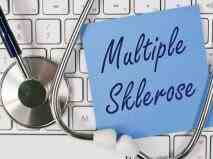Around 280,000 people in Germany live with multiple sclerosis. Every year around 15,000 people are newly diagnosed with MS in this country, increasingly more women than men. The significantly higher proportion of women with relapsing forms of MS (RRMS) is striking – the ratio of women to men is now 3:1 (German MS Register, 2020). In women up to the age of 20, the ratio is even 4:1. This relationship changes when looking at the primarily chronic progressive form of MS (PPMS), which affects about half of men.
MS leads to the most limitations in everyday life in early adulthood. This also includes the significantly earlier retirement compared to the normal population due to reduced earning capacity. This applies in particular to women, who draw a disability pension much more frequently than men with the same degree of disability. The risk of women with MS only taking part in marginal jobs in working and working life with the high risk of poverty in old age has so far received far too little attention and requires further investigation. In addition, additional supporting offers must be created for this group of people in order to prevent the loss of work and employment opportunities and poverty in old age at an early stage. It is also important to note that young girls who develop MS often face difficulties in ever gaining employment or sufficient pension entitlements.
Despite the noticeable hormonal influences on the disease, the high proportion of women with MS in the decades of research into MS has not led to any particular attention being paid to female needs in medical care and support – with the exception of the issues of pregnancy (maternity) and breastfeeding. The European Pregnancy Study revealed that disease activity decreases significantly during pregnancy, but the relapse rate initially increases after pregnancy, but overall the course of the disease is not negatively influenced. Within the framework of self-help support, the DMSG provides advice on the subject of the desire to have children, pregnancy, motherhood and parenthood. We demand being able to bill these as part of regular statutory health insurance benefits. Financing within the scope of § 20h SGV V services is insufficient.
Healthy lifestyle campaigns could reduce women’s risk of MS. There is ample data that childhood obesity increases MS risk in girls, as does smoking and alcohol, not getting enough fresh air, not getting enough sun, and not being physically active. The course of the disease is also negatively influenced by obesity, nicotine, alcohol and a lack of exercise.
Today’s generally late first pregnancy can make it difficult for women who develop MS after the age of 30 to have children without fertility treatments.
We therefore demand that the payers in these cases reimburse fertility treatments under certain conditions even after the age of 40 and no longer make them dependent on whether a marriage exists.
Likewise, MS research has not paid enough attention to the course of MS after menopause. Here the urgent question arises as to the influence of a lack of or decreasing ovarian activity on the course of MS. The question of hormone replacement therapy should be considered with possible non-MS contraindications in mind. Under no circumstances should hormone therapy be dispensed with because of the diagnosis of MS, as was quite common in the past.
After the menopause, the degree of disability according to the EDSS (Expanded Disability Status Scale) in women with MS steadily worsens. The risk of osteoporosis due to lack of exercise, avoidance of sun exposure due to increased sensitivity to heat, insufficient vitamin D substitution and hormonal depletion requires complex interventions, which are not yet regularly included in the current MS therapy, but belong in an adequate modern MS therapy:
- Regular physiotherapy at least three times a week supplemented by functional training or rehabilitation sports,
- Vitamin D substitution according to vitamin D levels,
- Early detection of the drop in hormone levels and, if necessary, hormonal substitution,
- Early detection of osteoporosis by measuring bone density.
The DMSG demands that people with MS be released from IgeL services and that the prescriptions for higher frequencies of physiotherapy be made budget-neutral. Preventive measures (such as prevention courses) should be actively offered to those at risk. The functional training and rehabilitation sport already established as a health insurance benefit should be established as a standard benefit without time restrictions. In addition, the DMSG calls for financial support for the creation of patient training on influenceable factors of the course and special behavioral measures under immunotherapies within the meaning of § 43 SGB V (health insurance) or within the framework of SGB VI (pension insurance), separately for adults and children and young people with multiple sclerosis, in order to convey the extensive information in a patient-oriented manner and thus strengthen the self-help powers at an early stage and improve the self-efficacy of people with MS. MS sufferers are thus empowered to positively influence the course of their disease themselves.
Responsible:
Prof. Dr. medical Judith Haas, Chair
Herbert Temmes, Federal Managing Director
Source: DMSG-Bundesverband eV – 02/27/2023
Editor: DMSG-Bundesverband eV – 02/27/2023

